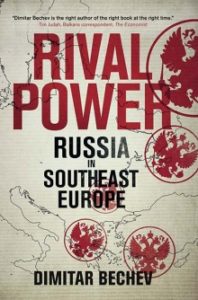 Growing Russian influence in the Balkans is undermining democratic institutions and retarding regional states’ prospects of accession to the European Union, observers suggest.
Growing Russian influence in the Balkans is undermining democratic institutions and retarding regional states’ prospects of accession to the European Union, observers suggest.
The EU is launching a diplomatic effort to accelerate steps to bring six countries in the Western Balkans into the EU fold after years of stop-start progress, Reuters reports:
Albania, Bosnia, Kosovo, Macedonia, Montenegro and Serbia all hope to join the European Union …But rising Russian influence, a migration crisis that straddles the region, Turkey’s drift toward authoritarian rule and a desire to strengthen European integration after Britain leaves in 2019 have presented the Balkans with an opportunity.
“It is time to finish the work of 1989,” European Commissioner Johannes Hahn told Reuters, referring to the EU’s eastward expansion after the fall of the Berlin Wall. “Either we export stability to the region or we import instability,” Hahn said, arguing that the EU’s accession process was the best way to fight corruption, organized crime and the threat of authoritarianism in the region.
 Russian sharp power is expanding as progress towards democracy and the rule of law in the western Balkans is either stagnating or going backwards, according to a recent report from the UK’s second chamber:
Russian sharp power is expanding as progress towards democracy and the rule of law in the western Balkans is either stagnating or going backwards, according to a recent report from the UK’s second chamber:
Russian and extreme Islamic influence is expanding, state capture of civil institutions is growing and support for EU membership is in decline, the international relations committee says. ….Russian soft power has expanded, partly by placing a large number of Russian Sputnik correspondents across the region who now service mainstream media. “The main agency sources of news, particularly in Serbia but also in Republika Srpska and Montenegro, is Sputnik,” it says.
Russian disinformation campaigns, designed to undermine democracy and sow distrust, are present in many Western countries, notes analyst Anne Applebaum, a board member of the National Endowment for Democracy. But they aren’t the whole story. For an underfunded ex-superpower trying to regain influence on the cheap, money and trolls only go so far, she writes for The Washington Post:
Of course, these are tiny groups in otherwise peaceful countries. Far more serious were the reports last week of Russian-trained mercenaries who have allegedly established a paramilitary unit in Bosnia, in order to back a Serb separatist leader. The news originally appeared in a local paper, but it was confirmed by the Bosnian government.

Credit: Balkan Insight
“This is part of a larger change in the international order, starting with the invasion in Georgia, Syria, Ukraine, the meddling in the US elections,” said Reuf Bajrović (left) Bosnia’s former energy minister, calling the appearance of the paramilitaries in Banja Luka a “watershed moment”.
“The Russians have decided to use their leverage in the Balkans to get the outcome they want: the end of the Dayton accords and the creation of a Serb statelet,” he told The Guardian.
The Kremlin is trying to resist Western influence in the Balkans on the cheap, says a new book, using low-cost tactics like disinformation, Coda Story adds:
 In a new book on Russia’s involvement in the Balkans — Rival Power: Russia’s Influence in Southeast Europe — the author Dimitar Bechev makes a convincing case that …..the Kremlin is making the most of a hand that is far weaker than it appears….But with resources stretched, Russia has had to resort to tactics like disinformation, smart public relations and hybrid warfare to achieve its goals.
In a new book on Russia’s involvement in the Balkans — Rival Power: Russia’s Influence in Southeast Europe — the author Dimitar Bechev makes a convincing case that …..the Kremlin is making the most of a hand that is far weaker than it appears….But with resources stretched, Russia has had to resort to tactics like disinformation, smart public relations and hybrid warfare to achieve its goals.
“Winning hearts and minds is easier and immensely more cost-effective than bribing governments and maintaining alliances, let alone resorting to hard power,” writes Bechev, a U.S.-based Balkans scholar. It’s a low-risk strategy, he argues, but which nonetheless presents a genuine challenge to the West. “Russia can’t roll back western influence, but it can make allies, spread influence and profit from opportunities as they arise.”
In a further sign of pro-Russian forces mobilizing the region’s uncivil society, Republika Srpska president Milorad Dodik awarded a medal of honor to Alexander Zaldostanov (below), the leader of the notorious Night Wolves bike gang, citing his commitment to “promoting and affirming human rights, tolerance among people and peoples, rule of law…” Zaldostanov, aka “The Surgeon,” was blacklisted by the US for his role in Russia’s annexation of Crimea.







